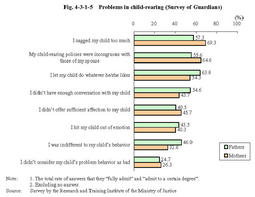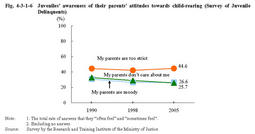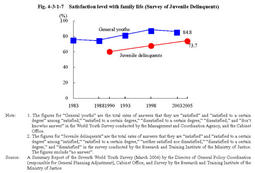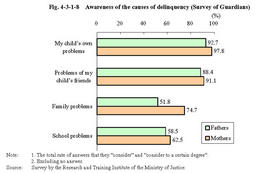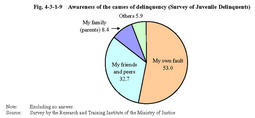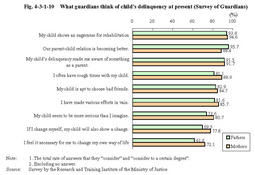| Previous Next Index Image Index Year Selection | |
|
|
2 Attitudes of juvenile delinquents and their guardians towards family relationships We examine the attitudes of juvenile delinquents and their guardians towards family relationships from the results of the Survey of Guardians and the Survey of Juvenile Delinquents.
The Survey of Guardians covers guardians who visited juvenile training schools for the first time for guardians'meetings or visitation during two months from February14to April15,2005.A total of486guardians composed of165fathers(including fathers in law;hereinafter the same in this Chapter)(34%)and321mothers(including mothers in law;hereinafter the same in this Chapter)(66.0%)responded to the survey. (1) Attitudes towards child-rearing,etc. Fig.4-3-1-5 shows a comparison between fathers and mothers concerning problems in child-rearing in the Survey of Guardians.
The rate was high for guardians who admit(the total of"fully admit"and"admit to a certain degree";hereinafter the same)that"I nagged my child too much,""my child-rearing policies were incongruous with those of my spouse,"and"I let my child do whatever he/she likes".In addition,more than40%of parents,both the mothers and fathers sides,admit that"I hit my child out of emotion,"which is a question related to child abuse. As compared to mothers,higher rate of fathers showed strong awareness of the lack of contact with their child,admitting that"I let my child do whatever he/she likes,""I didn't have enough conversation with my child,"and"I was indifferent to my child's behavior".In contrast,mothers seemed to be more concerned about child-rearing than fathers,and a higher rate of mothers were strongly aware that the disagreements between parents and excessive meddling was the problem,admitting that"my child-rearing policies were incongruous with those of my spouse"and"I nagged my child too much". Fig.4-3-1-5 Problems in child-rearing(Survey of Guardians) Fig.4-3-1-6 shows inter-annual comparison of answers to major questions concerning parents'attitudes towards child-rearing in the Survey of Juvenile Delinquents.The rate of juveniles who feel that"my parents are too strict"was the highest at44.6%,showing no significant changes in inter-annual comparison.However,the rate of juveniles who feel that"my parents don't care about me"and"my parents are moody"has been on a declining trend.Considering guardians'awareness of their child-rearing,juvenile delinquents seem to be offended by excessive meddling mainly by mothers,but have less dissatisfaction with their parents on other points than before. Fig.4-3-1-6 Juveniles'awareness of their parents'attitudes towards child-rearing(Survey of Juvenile Delinquents) Fig.4-3-1-7 shows a comparison between juvenile delinquents and general youths on their satisfaction level with family life.The satisfaction level with family life has been on a rise for both juvenile delinquents and general youths,but juvenile delinquents'satisfaction level is more than10points lower than that of general youths. Fig.4-3-1-7 Satisfaction level with family life(Survey of Juvenile Delinquents) (2) Awareness of the causes of delinquency of juvenile delinquents and their guardians Fig.4-3-1-8 shows the answers of fathers and mothers to the question,"How much do you think the following problems caused your child's delinquency?"in the Survey of Guardians.
The rate was highest for guardians(92.7%of fathers and97.8%of mothers)who consider(the total of"consider"and"consider to a certain degree")that their child's delinquency was caused by"their child's own problems,"followed by those(88.4%of fathers and91.1%of mothers)who consider that their child's delinquency was caused by"problems of their child's friends".There was a gap between the rates of fathers(51.8%)and mothers(74.7%)who consider that the child's delinquency was caused by"family problems".Fathers are less likely to associate their child's delinquency with family problems than mothers. Fig.4-3-1-9 shows the answers of juvenile delinquents to the question,"What do you think causes you to commit delinquency?"in the Survey of Juvenile Delinquents. The rate was highest at53.0%for juveniles who consider that their delinquency was"their own fault,"followed by those who consider that their delinquency was caused by"their friends and peers"(32.7%)and those who consider that their delinquency was caused by"their family(parents)"(8.4%).Although the question in the Survey of Guardians allowed multiple answers and that in the Survey of Juvenile Delinquents did not,the top cause of juvenile delinquency chosen in both surveys was juveniles'own problems,followed by problems of friends and problems of families. Fig.4-3-1-8 Awareness of the causes of delinquency(Survey of Guardians) Fig.4-3-1-9 Awareness of the causes of delinquency(Survey of Juvenile Delinquents) Fig.4-3-1-10 shows the percentage of fathers and mothers who answered"Yes"to the question,"Do you think the following statements well describe your present idea about your child's delinquency?"in the Survey of Guardians.The rate was high for parents who accept their child's present attitudes positively,answering that they think"my child shows an eagerness for rehabilitation"and"our parent-child relation is becoming better".Compared with fathers,mothers are apt to strongly feel a stalemate,answering that"I often have rough times with my child"and"I have made various efforts in vain,"or to strongly feel a necessity for changing themselves,answering that"if I change myself,my child will also show a change"and"I feel it necessary for me to change my own way of life". Fig.4-3-1-10 What guardians think of child's delinquency at present(Survey of Guardians) |
